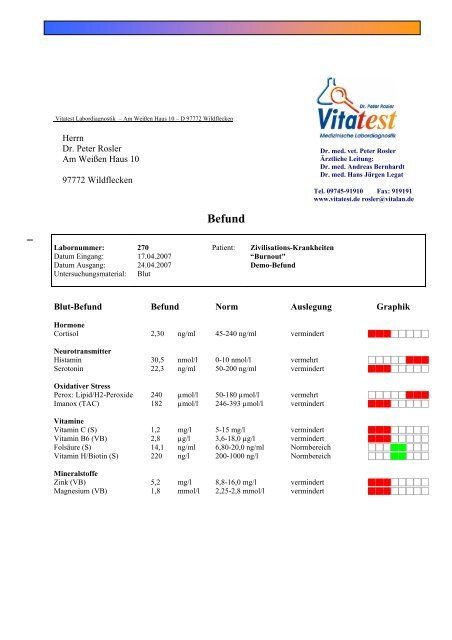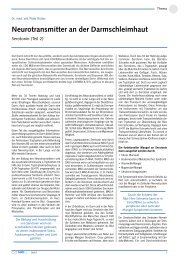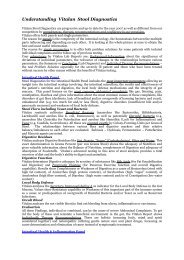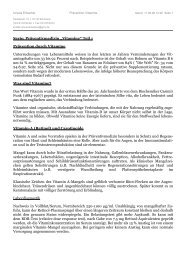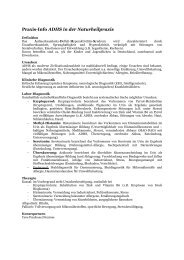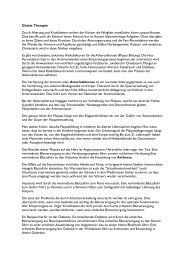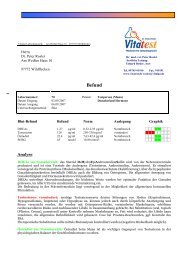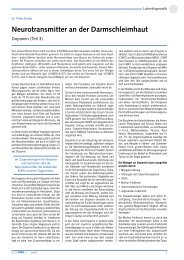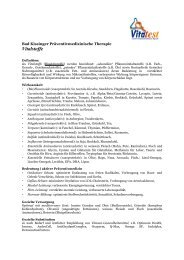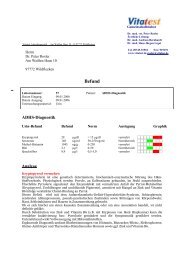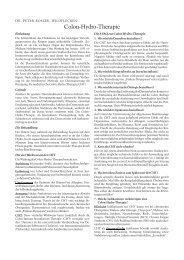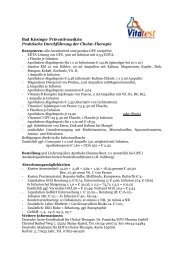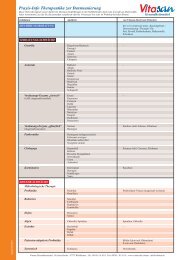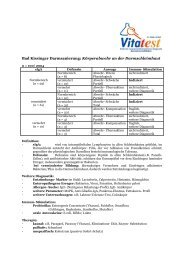Demo-Befund BurnOut - Vitatest
Demo-Befund BurnOut - Vitatest
Demo-Befund BurnOut - Vitatest
Create successful ePaper yourself
Turn your PDF publications into a flip-book with our unique Google optimized e-Paper software.
<strong>Vitatest</strong> Labordiagnostik – Am Weißen Haus 10 – D 97772 WildfleckenHerrnDr. Peter RoslerAm Weißen Haus 1097772 WildfleckenDr. med. vet. Peter RoslerÄrztliche Leitung:Dr. med. Andreas BernhardtDr. med. Hans Jürgen LegatTel. 09745-91910 Fax: 919191www.vitatest.de rosler@vitalan.de<strong>Befund</strong>Labornummer:Datum Eingang:Datum Ausgang:Untersuchungsmaterial:27017.04.200724.04.2007BlutPatient:Zivilisations-Krankheiten“Burnout"<strong>Demo</strong>-<strong>Befund</strong>Blut-<strong>Befund</strong> <strong>Befund</strong> Norm Auslegung GraphikHormoneCortisol 2,30 ng/ml 45-240 ng/ml vermindert NeurotransmitterHistamin 30,5 nmol/l 0-10 nmol/l vermehrt Serotonin 22,3 ng/ml 50-200 ng/ml vermindert Oxidativer StressPerox: Lipid/H2-Peroxide 240 µmol/l 50-180 µmol/l vermehrt Imanox (TAC) 182 µmol/l 246-393 µmol/l vermindert VitamineVitamin C (S) 1,2 mg/l 5-15 mg/l vermindert Vitamin B6 (VB) 2,8 µg/l 3,6-18,0 µg/l vermindert Folsäure (S) 14,1 ng/ml 6,80-20,0 ng/ml Normbereich Vitamin H/Biotin (S) 220 ng/l 200-1000 ng/l Normbereich MineralstoffeZink (VB) 5,2 mg/l 8,8-16,0 mg/l vermindert Magnesium (VB) 1,8 mmol/l 2,25-2,8 mmol/l vermindert
Beer in MesoPotamiaand EgYPtbefore a divine rmage, fo[owed by a banquet at which the consumptionof food and drink by the priests and worshipersinvoked the presence of the gods and the spirits of the dead'Beer was iust as irnportant in ancient Egyptian culture' wherereferences to it go b"tk nl-o't as far' It is mentioned in documentsfrom the third dynasty, which began in 2650 BcE' andseveral varieties of beer are mentioned in "Pyramid Texts"' thefunerary texts found inscribed in pyramids from the end of thefifth dynasty, around 2350 BCE' (The Egyptians developed theirown form of writing shortly after the Sumerians' to record bothmundane transactions and kingly exploits' but whether it wasan independent development or inspired by Sumerian writingremains unclear.) one survey of Egyptian literature found thatbeer, the Egyptian word for which was hekt' was mentionedmore times than any other foodstuff' As in Mesopotamia' beerwas thought to have ancient and mythological origins' and itappears in prayers, myths' and legends'One Egyptian tale even credits beer with saving humankindfrom destruction' Ra, the sun god' learned that humankind wasplotting against him, and dispatched the goddess Hathor toeract punishrnent' But such was her ferocity that Ra fearedthere would soon be nobody left to worship him' and he tookpity on humankind' He prepared a vast amount oi,ft;t. t"l"tthousand jars of it, in some versions of the story-dyed it red toresemble blood, and spread it over the fields' where it shone iikei1 vrlst mirror' Untho' p"osed to admire her reflection and thenstttoped to clrink some of the mixture' She became intoxicated'fell irslcep, ancl forgot about her bloody mission' Humankindwas saved, and Hathor became the goddess of beer and brew-Civilized Beering. Versions of this story have been found inscribed in the tombsof Egyptian kings, including Tutankhamen, Seti I, and Ramsesthe Great.In contrast to the Mesopotamians' relaxed attitude towardintoxication, however, a strong disapproval of drunkenness wasexpressed in the practice texts copied out by apprentice scribesin Egypt, many of which have survived in large quantities in rubbishmounds. One passage admonishes young scribes: "Beer, itscareth men from thee, it sendeth thy soul to perdition. Thou artIike a broken steering-oar in a ship, that is obedient on neitherside." Another example, from a collection of advice called "TheWisdom of Ani," gives a similar warning: "Take not upon thyselfto drink a jug of beer. Thou speakest, and an unintelligibleutterance issueth from thy mouth." Such scribal training texts,however, are unrepresentative of Egyptian values in general.fhey disapprove of almost everything except endless studying in,rrder to pursue a career as a scribe. Other texts have titles such.ls "Do Not Be a Soldier, Priest or Baker," "Do Not Be a Husl,,tndman,"and "Do Not Be a Charioteer."Mesopotamians and Egyptians alike saw beer as an ancient,drink that underpinned their existence, formed part',,rcl-given,,1 their cultural and religious identity, and had great socialrrrl)ortance. "To make a beer hall" and "to sit in the beerl, rll" were popular Egyptian expressions that meant "to have a,,,rcl time" or "to carouser" while the Sumerian expression al,,rrrring of beer" referred to a banquet or celebratory feast,, ,,1 f ormal visits by the king to high officials' homes to receivelrrrte w€re recorded as "when the king drank beer at the,st'of so-and-so." In both cultures, beer was a staple food-)a


